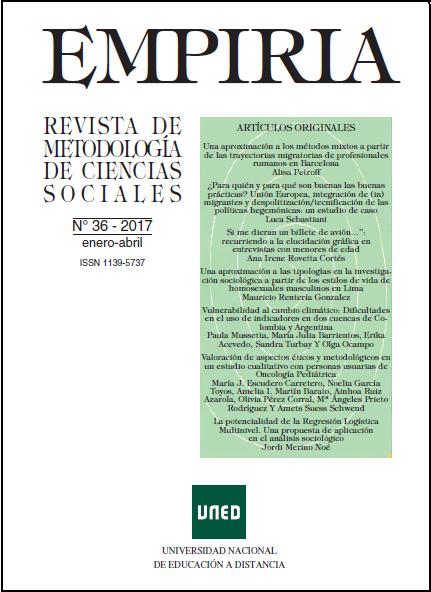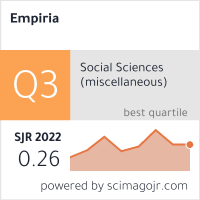For whom and for what are best practices “best”? European Union, migrant integration and the depoliticization/ technification of hegemonic policies: a case study
DOI:
https://doi.org/10.5944/empiria.36.2017.17858Keywords:
best practices, European Union, migrant integration, policies, depoliticization/technificationAbstract
Between the end of 90s and the beginning of the new century, a political framework at European Union level has been established. This framework fosters the achievement of a common understanding of migrant integration and promotes mechanisms of coordination, funding, information exchange and “best practices” through the affected institutional levels, by means of soft law. In this paper I will analyse and discuss some of the most important consequences derived from the most important actors' understanding of “integration”. I will use the case of “best practices” as an example, since they are considered as a fundamental tool within EU multi-level governance mechanisms. I will show that in the EU context, the very notion of integration has been constructed through an exercise of (apparent) depoliticization and technification, whose results are contradictory -since the political element often “returns” and manifests itself “at the bottom”, “at the border” and “within” the technical element- and at the same time effective -since this exercise has been able to foster and shape certain ways of knowing, speaking and acting on migrant integration, naturalizing unequal power relations in society itself- . This paper is based on the empirical materials proceeding from the fieldwork done in Brussels between 2011 and 2012. It is made up of interviews done to the most important social and political actors within the EU integration framework, observations of various meetings and the reading of numerous sources.
Downloads
Downloads
Published
How to Cite
Issue
Section
License
Los autores que publican en esta revista están de acuerdo con los siguientes términos:a) Los autores conservan los derechos de autor y garantizan a la revista el derecho de ser la primera publicación del trabajo al igual que licenciado bajo una Licencia Internacional Creative Commons CC BY-NC-SA 4.0.
b) Se permite y se anima a los autores a difundir electrónicamente las versiones pre-print (versión antes de ser evaluada) y/o post-print (versión evaluada y aceptada para su publicación) de sus obras antes de su publicación, ya que favorece su circulación y difusión más temprana y con ello un posible aumento en su citación y alcance entre la comunidad académica.










